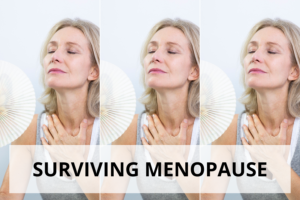
The Menopause Survival Guide: What to Expect and How to Cope

Menopause is a natural phase of life, yet it often carries a lot of misinformation and anxiety. As women approach this significant transition, understanding what to expect and how to manage the changes can make the journey smoother and more empowering.
This guide aims to provide you with information and practical tips to help you navigate menopause with confidence and grace.
Oprah Winfrey
“So many women I’ve talked to see menopause as an ending. But I’ve discovered this is your moment to reinvent yourself after years of focusing on the needs of everyone else. It’s your opportunity to get clear about what matters to you and then to pursue that with all of your energy, time, and talent.”
Understanding Menopause
What is Menopause?
Menopause marks the end of a woman’s menstrual cycles and fertility. It is defined as occurring 12 months after your last menstrual period. Prior to menopause, women may experience sporadic and irregular periods, but the formal definition of menopause is 12 months after your last menstrual cycle. Menopause typically occurs between the ages of 45 and 55 but can happen earlier or later.
Stages of Menopause
Perimenopause
This is the transitional phase leading up to menopause, often characterized by irregular menstrual cycles and various symptoms. It can start as early as your late 30s or early 40s and last several years
Menopause
This is the point at which a woman has not had a menstrual period for 12 consecutive months.
Postmenopause
This phase follows menopause and continues for the rest of a woman’s life. Symptoms may ease for some women, but health considerations related to aging become important. Stay tuned for more details!
Common Symptoms and Challenges
Menopause brings a variety of symptoms that can affect your quality of life. Understanding these symptoms can help you manage them more effectively.
- Hot Flashes and Night Sweats – Sudden feelings of heat that can be intense and are often accompanied by sweating and a rapid heartbeat.
- Mood Swings and Irritability – Hormonal changes can lead to emotional fluctuations, including irritability, anxiety, and depression.
- Sleep Disturbances – Many women experience difficulty falling or staying asleep, often due to night sweats or other discomforts.
- Physical Changes – These can include weight gain, thinning hair, dry skin, and decreased breast fullness.
- Cognitive Changes – Some women report issues with memory or concentration during menopause.
Coping Strategies
Adjusting your lifestyle can make a significant difference in managing menopause symptoms. In this section we will discuss various changes that can help manage any symptoms you may be experiencing.
Lifestyle Changes
- Exercise Regularly – Physical activity can help alleviate many symptoms, improve your mood, and help you maintain a healthy weight.
- Stay Hydrated – Drinking plenty of water can help manage bloating and dry skin.
- Getting Adequate Sleep – Establish a regular sleep routine, create a restful environment, and avoid caffeine and heavy meals before bedtime.
Dietary Adjustments
- Balanced Diet – Focus on a diet rich in fruits, vegetables, whole grains, and lean protein.
- Calcium and Vitamin D – These nutrients are crucial for bone health, which can be affected during menopause.
- Phytoestrogens – These are found in soy products, flaxseeds, and other plants, and they can help balance hormone levels naturally.
Stress Management Techniques
- Mindfulness and Meditation – These practices can reduce stress and improve emotional well-being.
- Yoga and Tai Chi – Gentle exercises that combine movement with breathwork can help reduce symptoms and improve overall health.
- Hobbies and Social Activities – Engaging in activities you enjoy and spending time with loved ones can provide emotional support and improve your mood.
Medical Treatments and Therapies
Hormone Replacement Therapy (HRT)
HRT involves taking estrogen and progesterone to relieve menopause symptoms. It can be highly effective but also comes with risks, including an increased risk of breast cancer, heart disease, and stroke. Consult your healthcare provider to determine if HRT is suitable for you.
Alternative Medical Treatments
- Bioidentical Hormones – These are chemically identical to your body’s hormones and may be available through compounding pharmacies. They are often marketed as more of a natural option than traditional HRT.
- Non-Hormonal Medications – Antidepressants, blood pressure medications, and other non-hormonal drugs can help manage specific symptoms like hot flashes and mood swings.
Natural Remedies
- Herbal Supplements – Black Cohosh, red clover, and evening primrose oil are popular herbal remedies that some women find helpful.
- Acupuncture – This traditional Chinese medicine technique can help reduce symptoms for some women.
- Aromatherapy – Essential oils like lavender, peppermint, and clary sage can help manage stress and improve sleep.
Emotional Well-being
Support Groups and Counselling
Connecting with others who are going through similar experiences can provide emotional support and valuable insights. Consider joining a menopause support group or seeking counselling to help navigate this transition.
Self-Care Practices
- Mindfulness and Meditation – Regular practice can enhance emotional resilience and reduce stress.
- Journaling – Writing down your thoughts and feelings can help you process emotions and track symptoms. This can be especially helpful to determine your triggers!
- Massage and Relaxation Techniques – Regular massages and relaxation techniques can help reduce tension and improve overall well-being.
Long-term Health Considerations
Menopause can have long-lasting effects on your overall health, so it’s important to consider the following:
Bone Health
Menopause accelerates bone density loss, increasing the risk of osteoporosis. To maintain bone health, ensure adequate calcium and vitamin D intake and engage in regular, weight-bearing exercises.
Cardiovascular Health
The risk of heart disease increases after menopause due to changes in hormone levels. Adopting a heart-healthy lifestyle, including a balanced diet, regular exercise, and not smoking, can help reduce this risk.
Cognitive Health
Some women may experience cognitive changes during menopause – things like memory lapses and brain fog. Staying mentally active through reading, puzzles, and learning new skills can help keep your mind sharp!
Personal Stores and Testimonials
Sarah’s Story
“Menopause hit me hard with hot flashes and mood swings. Joining a local support group and practicing yoga made a huge difference. I also found that keeping a journal helped me track my symptoms and identify triggers.”
Lisa’s Experience
“I was initially hesitant about HRT, but after discussing it with my doctor, I decided to give it a try. The improvement in my symptoms was remarkable! I also made dietary changes and started taking calcium supplements to support my bone health.”
Maria’s Journey
“I turned to natural remedies like black cohosh and acupuncture to manage my menopause symptoms. It took some trial and error, but I eventually found a combination that worked for me. Staying active and connecting with other women going through the same thing has been incredibly helpful.”
Conclusion
Menopause is a significant transition that brings both challenges and opportunities for growth. You can thrive during this phase of life by understanding the stages and symptoms, adopting coping strategies, exploring medical treatments, and prioritizing emotional well-being and long-term health.
Remember, you are not alone on this journey! Whether through support groups, counselling, or connecting with other women, there are resources and communities available to help you navigate menopause with confidence and grace.
Empower yourself with knowledge and practical solutions, and embrace this new chapter in your life!
Frequently Asked Questions (FAQ)
What is menopause?
Menopause is the natural biological process that marks the end of a woman’s menstrual cycle. It is diagnosed after 12 months without a menstrual period. menopause typically occurs in women in their late 40s to early 50s.
What are the common symptoms of menopause?
Common symptoms of menopause include hot flashes, night sweats, mood swings, vaginal dryness, sleep disturbances, and irregular periods. The severity and duration of symptoms can vary from woman to woman.
Can Menopause affect mental health?
Yes, menopause can affect mental health. Hormonal changes can lead to mood swings, anxiety, depression, and cognitive changes like memory lapses. It’s essential to seek support and consider stress management techniques to help cope with these changes.
Is Hormone Replacement Therapy (HRT) safe?
HRT can be highly effective in relieving menopause symptoms, but it comes with risks, including an increased chance of breast cancer, heart disease, and stroke. It is essential to consult your healthcare provider to determine if HRT is the right option for you based on your individual health needs and risks.
Are there natural remedies for managing menopause symptoms?
Yes, several natural remedies exist that some women find helpful in managing menopause symptoms. These include herbal supplements like black cohosh, red clover, evening primrose oil, acupuncture, and aromatherapy. But remember, consulting with a healthcare professional before starting any new treatment is recommended.
How can I maintain bone health during menopause?
To maintain bone health during menopause, make sue to get adequate calcium and vitamin D, engage in weight-bearing exercises, and avoid smoking and excessive alcohol consumption. These lifestyle changes can help reduce the risk of osteoporosis.
Can menopause affect cardiovascular health?
Yes, the risk of heart disease incrases after menopause due to changes in hormone levels. Adopting a heart-healthy lifestyle, including a balanced diet, regular exercise, and not smoking, can help reduce this risk.
How long do menopause symptoms last?
Menopause symptoms usually last for about four to five years on average, but the duration can vary significantly among different women. Some may experience symptoms for a shorter period, while others may have them for a decade or more.
What lifestyle changes can help manage menopause symptoms?
Lifestyle changes that can help manage menopause symptoms include eating a balanced diet, staying physically active, practicing stress management techniques like yoga and meditation, and getting regular sleep. Avoiding triggers like caffeine and alcohol can also help reduce symptoms like hot flashes.
Where can I find support during menopause?
Support during menopause can be found through support groups, counselling, family, and friends. Many communities have local support groups and online forums where women can share their experiences and offer advice and support.
If you found this guide helpful, please share it with others who may benefit from these insights. And if you have any additional tips or personal experiences, we’d love to hear from you in the comments below!
You May Also Like

Discovering Pickleball: A Fun Path to Health and Social Connection for Women Over 50
June 9, 2024
Unlocking Abundance: Say Goodbye to a Scarcity Mindset
June 22, 2024